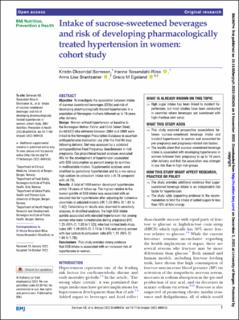| dc.contributor.author | Børresen, Kristin Øksendal | |
| dc.contributor.author | Rosendahl-Riise, Hanne | |
| dc.contributor.author | Brantsæter, Anne Lise | |
| dc.contributor.author | Egeland, Grace M. | |
| dc.date.accessioned | 2022-12-16T14:42:15Z | |
| dc.date.available | 2022-12-16T14:42:15Z | |
| dc.date.created | 2022-12-01T09:10:24Z | |
| dc.date.issued | 2022 | |
| dc.identifier.issn | 2516-5542 | |
| dc.identifier.uri | https://hdl.handle.net/11250/3038333 | |
| dc.description.abstract | Objective: To investigate the association between intake of sucrose-sweetened beverages (SSBs) and risk of developing pharmacologically treated hypertension in a population of Norwegian mothers followed up to 10 years after delivery.
Design: Women without hypertension at baseline in the Norwegian Mother, Father and Child Cohort Study (n=60 027) who delivered between 2004 and 2009 were linked to the Norwegian Prescription Database to ascertain antihypertensive medication use after the first 90 days following delivery. Diet was assessed by a validated semiquantitative Food Frequency Questionnaire in mid pregnancy. Cox proportional hazard analyses evaluated HRs for the development of hypertension associated with SSB consumption as percent energy by quintiles in multivariable models. Supplemental analyses were stratified by gestational hypertension and by a low versus high sodium-to-potassium intake ratio (<0.78 compared with ≥0.78).
Results: A total of 1480 women developed hypertension within 10 years of follow-up. The highest relative to the lowest quintile of SSB intake was associated with an elevated risk for hypertension after adjusting for numerous covariates in adjusted models (HR: 1.20 (95% CI: 1.02 to 1.42)). Consistency in results was observed in sensitivity analyses. In stratified analyses, the high SSB intake quintile associated with elevated hypertension risk among women who were normotensive during pregnancy (HR: 1.25 (95% CI: 1.03 to 1.52)), who had normal body mass index (HR: 1.49 (95% CI: 1.13 to 1.93)) and among women with low sodium to potassium ratio (HR: 1.33 (95% CI: 1.04 to 1.70)).
Conclusions: This study provides strong evidence that SSB intake is associated with an increased risk of hypertension in women. | en_US |
| dc.language.iso | eng | en_US |
| dc.publisher | BMJ | en_US |
| dc.rights | Navngivelse-Ikkekommersiell 4.0 Internasjonal | * |
| dc.rights.uri | http://creativecommons.org/licenses/by-nc/4.0/deed.no | * |
| dc.title | Intake of sucrose-sweetened beverages and risk of developing pharmacologically treated hypertension in women: cohort study | en_US |
| dc.type | Journal article | en_US |
| dc.type | Peer reviewed | en_US |
| dc.description.version | publishedVersion | en_US |
| dc.rights.holder | Copyright 2022 the authors | en_US |
| dc.source.articlenumber | e000426 | en_US |
| cristin.ispublished | true | |
| cristin.fulltext | original | |
| cristin.qualitycode | 1 | |
| dc.identifier.doi | 10.1136/bmjnph-2022-000426 | |
| dc.identifier.cristin | 2086627 | |
| dc.source.journal | BMJ Nutrition, Prevention and Health | en_US |
| dc.identifier.citation | BMJ Nutrition, Prevention and Health. 2022, e000426. | en_US |

